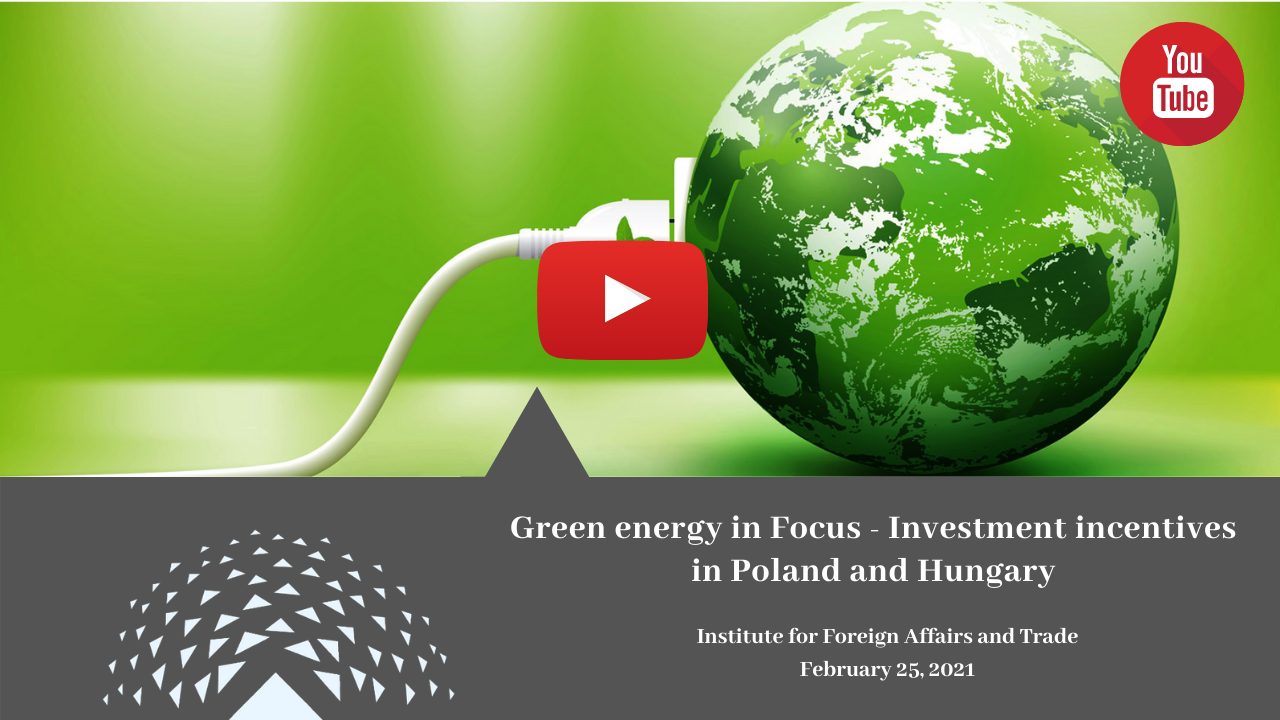On 25 February 2021, the Institute for Foreign Affairs and Trade (IFAT) organized an online roundtable discussion titled „Green energy in focus – Investment incentives in Poland and Hungary”. The event was the first within the project supported by the Waclaw Felczak Foundation and was part of the Felczak Workshop series and the Hungarian-Polish Knowledge Base Programme. In the opening words Anna Wisniewski, project coordinator and associated research fellow of the Institute for Foreign Affairs and Trade emphasized that in the forthcoming months three important topics shall be discussed by the invited experts in the context of the Polish-Hungarian economic relations – green energy, innovation, and best practices in bilateral economic relations. The expert participating in the present discussion were Mr Markus Becker, Head of Government Affairs & Policy for Europe of GE, Mr Márton Buda, strategy expert of MVM, Mr Tomasz Zjawiony, president of the Chamber of Commerce and Industry in Katowice, and Mr Márton Ugrósdy, Director of the Institute for Foreign Affairs and Trade (IFAT). The discussion was moderated by Mr Gábor Deák, Supervisory Board member of the Waclaw Felczak Foundation.
Introducing the discussion, Gábor Deák drew attention to the different energy background of the two countries, Poland and Hungary, and based on this aspect asked the experts to summarize their view on the challenges resulting from the Green Deal and sustainability goals. Tomasz Zjawiony emphasized the structural problems of the Silesian industrial region, considering the Green Deal, of which Poland is a great beneficiary, to be a challenge but also an opportunity. However, this also shows the dimension of the problem, as coal-based energy supply raises serious social and structural transformation issues, especially in the Southern Poland regions, and these aspects are to be considered when planning. Above all, the small and medium enterprises can provide a solution to this situation, the eco-awareness of this sector, support for higher efficiency and innovation can contribute to achieving a climate-neutral economy. Márton Ugrósdy argued that the harmonization of competitiveness goals and energy policy targets is the major challenge in our countries. Regarding Hungary, the modernizing of the energy sector rests on three pillars, on the one hand, continuing the power plant refurbishment, second, the replacement of lignite with natural gas in the traditional thermal power station, and thirdly, supporting renewables, especially expending photovoltaic capacities. Energy efficiency can be supported by greening of the transport, and government support for greening has contributed to the spread of hybrid and electric cars in Hungary. Furthermore, the use of renewable energy sources by small and medium sized enterprises was supported on the state level as well. Regional cooperation is inevitable at such areas like transport and construction industry (building modernization and insulation).
Markus Becker approached the issue from the perspective of a multinational company, but at the same time emphasized that to find appropriate answers for global issues it is crucial to consider the individual economies and local aspects of a given problem. For GE there are two key areas, one is the accelerated deployment of renewables and the second is gas power. GE as a company is uniquely positioned to play a role through its scale, breadth, and technological depth in this process. Agreeing with the previous speakers, Mr Becker underlined the need of decarbonisation of the economy and electrification of energy-use sectors, like transportation, industry, heating, that could be the key to restructuring and achieving efficiency. Buda Márton emphasized that decarbonization and digitalization-driven modernization of the energy-use are two priorities in the MVM corporate strategy. Furthermore, MVM aims to considerably increase renewable generation with a dominance in photovoltaic technology, as well as keeping its existing nuclear capacities. On the customer side, utilities gain opportunities with the growing need for smart technologies (complex energy solutions, smart street lighting, etc.) that can make a major contribution to the sustainability process through energy efficiency. Hydrogen produced from clean energy could decrease various industry emission and can contribute thereby to achieving climate targets.
The study of the event (in English) is available here!
The full recording can accessed at the link below or on our YouTube-channel!
JTNDaWZyYW1lJTIwd2lkdGglM0QlMjIxMDAlMjUlMjIlMjBoZWlnaHQlM0QlMjI0NTAlMjIlMjBzcmMlM0QlMjJodHRwcyUzQSUyRiUyRnd3dy55b3V0dWJlLmNvbSUyRmVtYmVkJTJGaTllTml3NE5tY3clMjIlMjBmcmFtZWJvcmRlciUzRCUyMjAlMjIlMjBhbGxvdyUzRCUyMmFjY2VsZXJvbWV0ZXIlM0IlMjBhdXRvcGxheSUzQiUyMGNsaXBib2FyZC13cml0ZSUzQiUyMGVuY3J5cHRlZC1tZWRpYSUzQiUyMGd5cm9zY29wZSUzQiUyMHBpY3R1cmUtaW4tcGljdHVyZSUyMiUyMGFsbG93ZnVsbHNjcmVlbiUzRSUzQyUyRmlmcmFtZSUzRQ==

